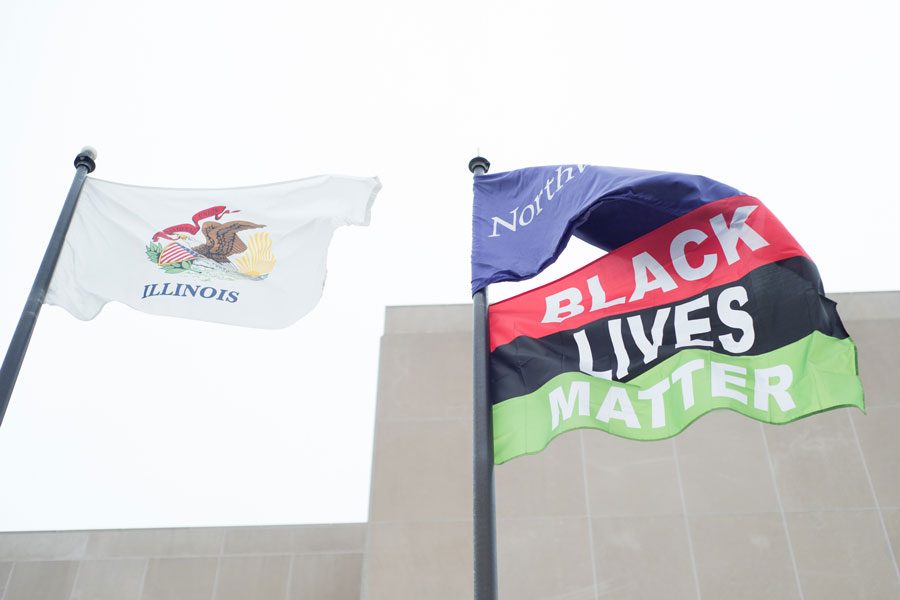Black and Queer Panel discusses Black Lives Matter movement, inclusivity
Daily file photo by Colin Boyle
The Black Lives Matter flag was raised over Norris University Center on Jan. 3 to commence two weeks of programming around the state of black lives in America. Two student groups cohosted a panel Tuesday about the intersectionality of race and queerness as part of the event.
January 11, 2017
Student groups hosted a panel Tuesday to discuss the intersectionality of race and queerness within the context of Northwestern and beyond.
“Black and Queer Panel,” held at Kresge Hall, was meant to be a space to give agency back to queer people of color and have a discussion on topics such as online dating, navigating NU and grassroots community involvement, event co-organizer Jayleen James said. The event was hosted by Rainbow Alliance and Queer Trans Intersex People of Color, an affinity discussion group in MSA, and was part of student-organized and administration-backed programming on the Black Lives Matter movement.
The Weinberg junior, who uses “they/them/their” pronouns, said the event acted as a healing space for everyone in the room.
They stressed the importance of cultivating a space where credit is rightfully granted to the queer people at the core of the Black Lives Matter movement.
James said the event focused on reclaiming the Black Lives Matter movement. The movement was originally founded by intersecting marginalized identities including black and queer women.
“But right now if anyone looks at the movement, it’s very cis, het(erosexual) and male,” James said.
Darcelle Pluviose, who co-organized the event with James, said the event allowed panelists to discuss blackness and queerness in an informal setting not usually found on college campuses.
The Communication junior said the event acknowledged the pain and hardships faced by those with marginalized identities, but also celebrated the happiness that comes with being black and queer.
Multicultural Student Affairs assistant director J.T. Turner, who uses “they/them/their” pronouns, attended the event and said they appreciated the panel’s inclusivity and intersectionality.
Turner said such spaces are “extremely important” for allowing students to craft their own narratives and empower one another. They said Tuesday’s panel and other spaces like MSA and Sustained Dialogue allow for healing and self-reflection.
Panelist Chelsea Mikael Frazier said the overarching theme of the event was an emphasis on honoring black queer life and black queer survival in the face of “insurmountable blockages.”
As a graduate student, Frazier said she appreciated the ability to connect with undergraduates outside of an academic setting. She said discussing strategies for how different panelists navigate life as queer people of color, as well as how to “maintain joy,” allowed for a sense of community-building.
“For me, having spaces where I can see other people who identify as black and queer or of color and queer is enormously powerful because more often than not, especially in classes, you’ll often find that you might be the only (person of color),” she said.
James said Rainbow Alliance and Queer Trans Intersex People of Color worked together to organize the event to give agency back to marginalized voices on campus.
Frazier said seeing so many people together to discuss the Black Lives Matter movement and the intersection of blackness and queerness in one place fostered a sense of community.
“Quite frankly, just to see the event well-attended tells me that there’s a need for these kind of spaces,” Frazier said. “Just to see it, to be around it, to feel that love, that was the most moving part of the experience for me tonight.”
Email: [email protected]
Twitter: @jakeholland97


